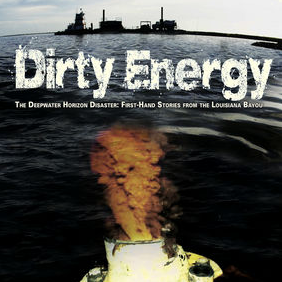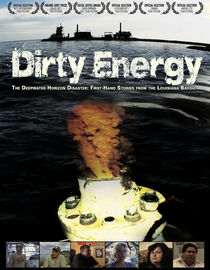
Dirty Energy
directed by Bryan D. Hopkins
Cinema Libre Studio

Ever since Rachel Carson published Silent Spring in 1962, which led to the banning of the pesticide DDT, the environmental movement has been portrayed by the right wing as nothing less than a shadow anti-capitalist agenda, less concerned with nature than with its ultimate goal of “ending our economic way of life.” As implausible as the statement sounds, after watching Dirty Energy, one might come to realize that nothing short of wholesale changes in our “way of life” could save us.
This engaging documentary looks at the aftermath of the BP Deepwater Horizon explosion and the resulting ruin it caused. At the time of the incident, the Gulf of Mexico furnished one third of the seafood eaten in the United States. Now you can’t find anyone to eat the stuff, even if they can sell it. Do you mind that your shrimp have no eyes? As the film shows, the explosion was only the first in a series of horrible occurrences brought on by British Petroleum. Their first reaction (as it was with Exxon in the Valdez spill) was to control the images. We all recall the shots of oily haze on the Gulf, a sheen of death miles long. That doesn’t do well for the corporate image, so BP, with the Obama administration’s backing, covered the spill with dispersants, including Corexit (which has been banned in Europe), in order for the oil to be broken up into smaller droplets, where supposedly naturally occurring bacteria in the Gulf will destroy the remaining oil. Even now, three years on, oil continues to spill from the site, the wildlife are dead or dying, and an entire way of life is ruined.
Aaron Viles of the Gulf Restoration Network brings up a point early on in the movie, and it haunts you while watching. “The state of Louisiana didn’t do this to themselves,” he says. “The entire nation did, and the entire nation should help make it right.” It is our gluttony for cheap, subsidized oil that lead to the explosion, and after the fact, it was BP’s greed that made a bad situation worse and wiped out the livelihoods of an entire portion of the country. It is heart-wrenching to watch as shrimper after shrimper relates his life, before and after. Manhandled into signing away their rights for ten cents on the dollar, families scatter across the country trying to earn a living and feed their children, unable to go back to the way of life that they learned from their fathers. At every turn they are stymied by lawyers and bureaucrats whose sole interests lie in bettering BP’s bottom line. Their health is shot, with many who found clean-up work in the aftermath coming down with “dispersant flu,” which, thanks to a single line in some EPA standard, isn’t considered an actionable cause for suing anyone in cases of toxic cleanup. It goes on and on.
And it will continue to go on until we, as a planet, do something to deal with the poisoners of our Earth. Until the oil companies invest as much in renewable sources of energy as they do for lawyers to screw over victims, until we have a government committed to actually helping the majority of its citizens instead of serving as a giant ATM for corporations, things will never change in any meaningful way. Dirty Energy compellingly shows us the horrors of greed as visited on the people of the Louisiana bayou, but sadly, you could probably plant a camera almost anywhere in this nation and film something equivalent, something that didn’t have to happen by people who knew better, all for a buck. That, it seems, is “our way of life.” And it needs to change, or we all will bear the rotten fruit of greed.
I imagine it goes good with eyeless shrimp.
Dirty Energy: http://dirtyenergymovie.com












